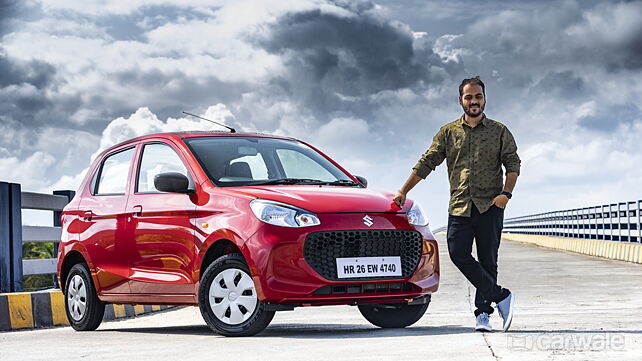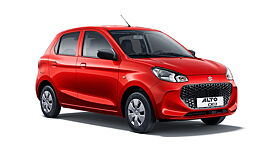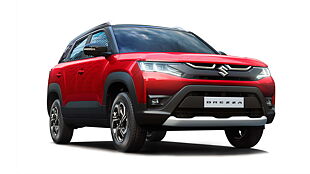Why would I buy it?
- Competent first car
- Easy to drive
- Zippy performance
Why would I avoid it?
- Looks basic
- Noisy at highway speeds
- Top-end variants miss out on essential features
What is it?
After a hiatus of over two years, the Alto K10 has finally made its comeback in the entry-level hatchback segment. It will be sold alongside the 800 and its stablemate S-Presso, and is positioned below the new Celerio. Besides bringing in the new K10C petrol engine, the Alto is now underpinned by the brand’s versatile Heartect platform. It also gets fresh exterior styling, a thoroughly redesigned cabin, and new funky colours.

Now, the new Heartect platform has resulted in increased dimensions and the Alto now measures 3,530mm in length and has a width of 1,490mm. The 2,380mm wheelbase is 20mm more than its predecessor, which translates to improved space for the rear occupants.

Visually, the K10 looks nowhere similar to the older model. Unlike the earlier K10, the new one gets a rounded shape and one could almost confuse it with its elder sibling, the Celerio. Taking inspiration from the Grand Vitara, the grille has been moved down and the bumper now holds the big single-piece grille with a honeycomb pattern. While the fog lamps have been given a miss, detailed styling elements like the honeycomb pattern around the headlamps, wheel covers, tail lamps, and speakers do add a touch of novelty. The Alto K10 continues to ride on 13-inch steel wheels and the lift-type door handles, too, have been retained.

What’s new inside and what’s on the feature list?

Like the exterior, the cabin of the Alto K10 has been given a significant improvement too. The dashboard is redesigned and although hard plastics make up most of the cabin, inclusions like brushed aluminium accents around the infotainment unit, aircon vents, and on the new steering wheel do give it a modern appeal.

Ergonomically, all the things are within easy reach, except for the dash-mounted window switches that might take time to get used to. Then there are storage places scattered all around the cabin. A decent-size glovebox along with two cupholders at the centre and a cubbyhole in the front add practicality and are convenient to use by the front occupants. Then there are 1-litre bottle holders which are restricted to the front doors only. Talking about the front seats, the black and beige fabric upholstery with a checkered pattern breaks the monotony of the all-black cabin. Although these don’t get an adjustable headrest, there’s just enough shoulder and headroom for a comfortable ride. Now, the K10 does not get any adjustment for the steering wheel nor a height-adjustable function for the driver. So, while it may be easy for people with average height to find a suitable driving position, taller folks might find the steering position a bit too low. Having said that, the overall visibility is good and it continues to be a relatively easy car to drive.

Moving to the rear, seat comfort here is adequate, if not great. There’s ample space to fit two occupants, however, inviting a third passenger will be a squeeze. While the stretched wheelbase does free up usable legroom, the fixed headrests are small and offer limited head support. Plus, the windows need to be rolled up/down manually. Then, the small cubbyholes on the door pads along with a small pocket behind the handbrake provide the only usable stowage spaces at the rear. Given the design for the posterior, the access to the boot is narrow but with 214 litres of capacity, it can gobble up to two small suitcases and a couple of grocery bags. The rear parcel shelf, too, comes in handy to carry additional belongings.

The Alto K10 is on offer in four trims, namely Std, LXi, VXi, and VXi Plus. We sampled the top-spec VXi Plus trim and it packs in a seven-inch touchscreen infotainment system with wired Apple CarPlay and Android Auto connectivity. There are four speakers which are decent enough and multiple preset audio modes too. The steering wheel also gets mounted controls along with voice commands. We even liked the amber-coloured digital instrument cluster that displays all the basic information, like two trip meters, fuel gauge, instantaneous fuel consumption, and gear position (for AMT variants). That said, a tachometer and a dedicated lock/unlock button could have been embedded for the higher variants.

In terms of safety equipment, as standard, the K10 gets dual front airbags, ABS, front seatbelt reminders (driver and co-driver), and rear parking sensors. Further, the higher-spec models get central locking and speed-sensing door locks. The Alto K10 is yet to be tested by Global NCAP.
What’s it like to drive?

The taking point of the Alto K10 is the now familiar 1.0-litre, three-cylinder petrol engine that also does duties on the S-Presso and Celerio. While the power output figures have not increased over the older one, the Dual Jet Dual VVT technology does bring out improved fuel efficiency and given that the Alto is lighter than its siblings, it is more enjoyable too. On the downside, none of the variants of the K10 is equipped with idle start/stop technology. Meanwhile, the ARAI claimed fuel efficiency stands at 24.39kmpl and 24.90kmpl for manual and AMT versions, respectively.

The power on tap feels sufficient and is very likeable in the way Alto delivers it. With the five-speed manual gearbox that we sampled, the light clutch and easy slotting gear shifts do make city roundabouts and manoeuvring in stop/go traffic a breeze. But the steering, like the older model, does feel a bit heavy and devoid of feedback and doesn’t self-centre adequately.

When driven primarily in the city at speeds below 40kmph, Alto’s suspension does a commendable job of absorbing bumps, minor potholes, and uneven surfaces. However, the engine is vocal if not strained at speeds above 80kmph and the tyre noise, too, creeps in here. Out on the highways when cruising close to 100kmph, we feel the ride quality could have been quieter with additional dampening. At these speeds, when driven on rough patches and broken roads, there are evident vertical movements, although not unsettling or jarring in any way.

How does it compare and what’s the price?

The Maruti Suzuki Alto K10 is priced between Rs 3.99 lakh and Rs 5.84 lakh (ex-showroom). As compared to its direct rival, Renault Kwid, it has the lowest starting price and also remains the most affordable option when looking at the top manual and automatic versions. On the other hand, the Maruti Suzuki S-Presso with Rs 15,000 to Rs 20,000 more is another alternative from the same family.

The Alto K10 will certainly entice and draw first-time car buyers and what helps its case is the bettered fuel-efficient engine, simple yet functional cabin, and the ease of an AMT gearbox. Sure, it looks vanilla and misses out on a handful of essential features, the new Alto K10 does offer a value-for-money deal given its easy-on-pocket maintenance and Maruti Suzuki’s widespread and trusted after-sales service network.
Pictures by Kapil Angane

































